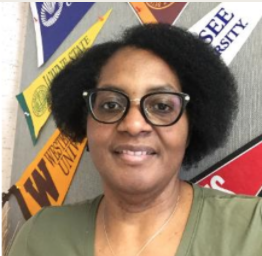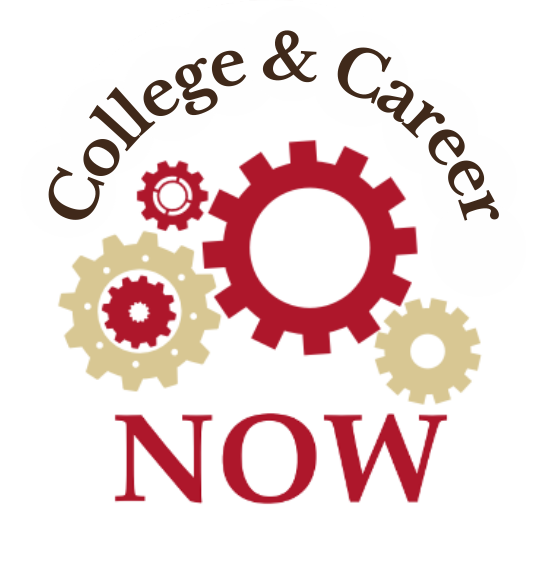
#SDSUSCFellows- Stacey Hickman-Jackson
Interview with Stacey Hickman-Jackson
K-8 School Counselor at Nolan Elementary & Middle School
If you could go back and visit your elementary, middle, and or high school counselor, what would you tell them?
I don’t have much to say to my high school counselor as I didn’t have any rapport with her, but I did have a teacher in middle school who was very supportive and ironically she ended up becoming a school counselor. If I could tell her anything I would tell her thank you for being my English teacher but wish I could have experienced her true calling during the time I knew her. Ironically, counseling turned out to be her true calling was counseling and she is now a retired school counselor. She made me feel very comfortable around her and she was truly a jack of all trades. As a counselor now, I understand the challenge behind building rapport with your students but we have a duty and responsibility to at least try to do so. I know that many counselors have several hundred students on their caseloads and can’t know every single one of them intimately but please make it your business to try to meet as many of them as you possibly can. There’s nothing worse than asking students, “what’s your counselor’s name?” and they say I don’t know or give you the name of somebody they know but who is not their counselor because they don’t know who their counselor is. Try to make yourself as visible as possible and with technology today, we are able to reach out to our students more readily than in the past.
What message of encouragement would you give to first generation students trying to figure out their postsecondary path?
I would tell them don’t box yourself in. I would tell them you don’t have to make a decision today, just give yourself a chance to explore what’s out there before you make a decision. It’s not a requirement as a freshman entering college to know what you will do after college. It’s ok to explore different things and to change your mind. It’s important to know what you like to do so that you can enjoy doing it because you’re going to be doing it for a very long time.
If you could give one piece of advice to higher ed professionals, what would you want them to know?
I would say that higher ed is just a term. It’s important to bring yourself down to the student’s level. You can’t address a student and deal with them at a level that they’re not on and you’re going to find that many students especially now during this pandemic are at varying levels. The term higher ed should not be an attitude or a way to feel superior. It’s necessary at some point to lay that title (Dr.) aside and just be somebody that’s going to be able to support the student and guide them. Especially now with covid, in the near future there are going to be many students who are very lost and need that interaction and guidance.
From your perspective, what really works in college counseling/advising, access, and success?
I think what’s currently working is that we have found ways to expand communication. I think pre-pandemic we were set in our ways in terms of communicating with students. Before it was really emphasized that students need to physically go and see the campus or meet in-person with an advisor, which I agree is ideal, but that is not an option for most. We are starting to meet students where they are and making it as basic as possible. Currently we are more in tune to students’ needs instead of institutional needs.
How do you hope to create a more equitable postsecondary advising system?
The one thing that I’m learning about equity is that it’s not one person’s responsibility, but that we all have a part in it. My goal would be to make sure that in anything I’m involved with, has fair and equal opportunities for all to participate. Everyone’s gone through the pandemic, there’s no one that hasn’t, but not everyone has the same level of needs and so we need to meet them where they are to lift them up and support them so that they can be successful. It’s important to get to know the individual and find out what their needs are versus stereotyping them based on what everyone else needs.
What do you hope to gain as a school counseling fellow?
When I started my application, I doubted myself thinking I didn’t have the “right kind of experience” to be doing this. Therefore, initially I thought I was going to do this to get more knowledge in terms of working with my students and providing support. What I have gotten is a buffet of different things such as making connections with individuals, hearing about some of the same things that I’m feeling from other people to know that I’m not alone, listening to ideas on how to reach out to students, and various other things that I didn’t anticipate. I feel much more capable now than I did coming in the door because I thought I was just going to sit back and listen and not say a word. But now I feel like I have a voice and have important contributions to make. I hope to just continue to grow as a counselor but also as an individual because I feel that what I learn as a counselor helps me become an even better person. At the end of the day, I hope it helps me grow individually and professionally.
Tell us about your advocacy project.
When I was in high school I didn’t know what I wanted to do. So it resonates with me that we need to do college and career exploration as early as possible. This doesn’t necessarily mean a formal sit down but rather start the conversation. It’s important to have students realize that there are many more occupations than doctors and lawyers. I want career exploration to be intentional, starting as early as kindergarten or pre-K depending on the environment. At the middle school level is where we really need to start having conversations about career paths, education and exposure. I want to introduce college and career counseling at the middle school level with academic support and tutorial sessions in a year round setting. Students would attend tutoring a couple days a week throughout the academic year to get academic support and at the same time they would explore career opportunities via job shadowing, interview/meeting with professionals in that particular field and field trips to local college campuses. They would spend part of their summer time engaging in a summer program while staying on a college campus to experience independence/self-governing opportunities, residential life and academic enrichment. I want to give students a little taste of the college experience from the dorm rooms to the classroom. I feel the sooner we start the more experienced and more understanding students will have with which to progress.
